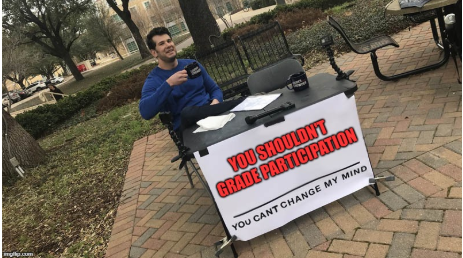
Why Did I Include Participation?
When I reflect back on my attitudes toward assessment early on in my career, I wanted the grade to include elements of both effort and ability. I am a strong proponent of students feeling like their grades were earned, not given. Thus, the grade would include criteria such as attending the classes, bringing the textbook and a writing instrument, utilizing my office hours, and participation during in-class activities to represent effort-based criteria. Exams, quizzes, writing assignments, group and solo projects, and any other productive output would be used to determine each student’s language ability or aptitude in the skill that is being taught through the second language such as essay writing or how to give a presentation.
{I sincerely apologize in advance for the next two paragraphs.}
I am not including growth as a factor because it requires accurate pre-testing to determine each student’s level of familiarity with the course’s content as a starting point for the semester. When schools implement pre-course ability testing to attempt to create a level playing field for the students in the course or in the sections across the course, a new can of worms is opened. In theory, the students would now enter the course without having to compete with other students who have vastly different ability levels. The first potential problem is that this could only be achieved if prospective students who show proficiency in what the course aimed to teach are able to test out of the course while others who are not adequately prepared for the course would be required to take a remedial course first and this is not always the case. Another issue is that if course is divided into different sections and the students are grouped by ability level, the course should not be listed in the same way for higher level sections and lower level sections. Otherwise, a student who earns an A in a lower section of Course 101 would appear to be more impressive to a graduate school or potential employer than a student earning a B in a higher section of Course 101. This can lead to students purposely tanking the entrance exam to get into a lower level section in the hopes of getting an easy A.
It should also be noted that I am assuming that the department does not have a mandatory grade curve in place. I am against curves because I don’t believe that grades should be based on intra-class competition but on meeting or surpassing the instructor’s expectations for what should be learned and experienced during the semester. I realize that the fear of grade inflation and instructors “giving” too many As in order to garner higher evaluations are reasons given for implementing grade curves but I feel that if the right educators are hired and departments do not put too much weight on student feedback, there is very little to actually fear.
So, to get back to answering this section’s question, I included participation factors in my course’s grading criteria because I wanted all of the students in the course to be able to earn an A and I wanted both ability and effort to play a role.
Would I Include a Participation Element Again?
The simple answer is yes. However, I am assuming that the course in question is not lecture based and would have opportunities for the students to actually develop skills instead of only studying theory. If I was asked to teach a large, theory-based course that had out-of-class readings and then a lecture element, the grading would lean on traditional assessment criteria like multiple choice tests to determine if the students were absorbing the content. This would be appropriate for courses that have a large number of students and little to no productive requirements. In a course like that, I might not even choose to track attendance and use it as a grading criteria. They are university students after all and don’t have to be there. If a student can do the readings and pass the tests by borrowing lecture notes or attending study groups then good for them.
How Much of the Grade Should Be Designated for Participation?
In the original syllabus that I mentioned at the beginning of the article, 10% was allocated to participation. I kept this over the years and deducted points each time a student was not prepared for class or did not participate at a satisfactory level (following a warning). I believe 10% is reasonable because it constitutes one full letter grade in a traditional 100-point scale. Students who work hard to meet the teacher’s expectations will get full participation points and their final grade will come down to how well they do on the tests and activities in the course. Students whose poor choices result in losing participation points will have a harder time earning a higher grade.
Conclusion
Grading and assessment are complicated issues and sources of great debate among educators. When I began teaching, I didn’t question the syllabus that was given to me and the students didn’t complain about the grading elements, just the final grade itself. I have changed a lot as an educator but I still see the value of reserving 10% of the grade for participation. Change my mind.

 RSS Feed
RSS Feed